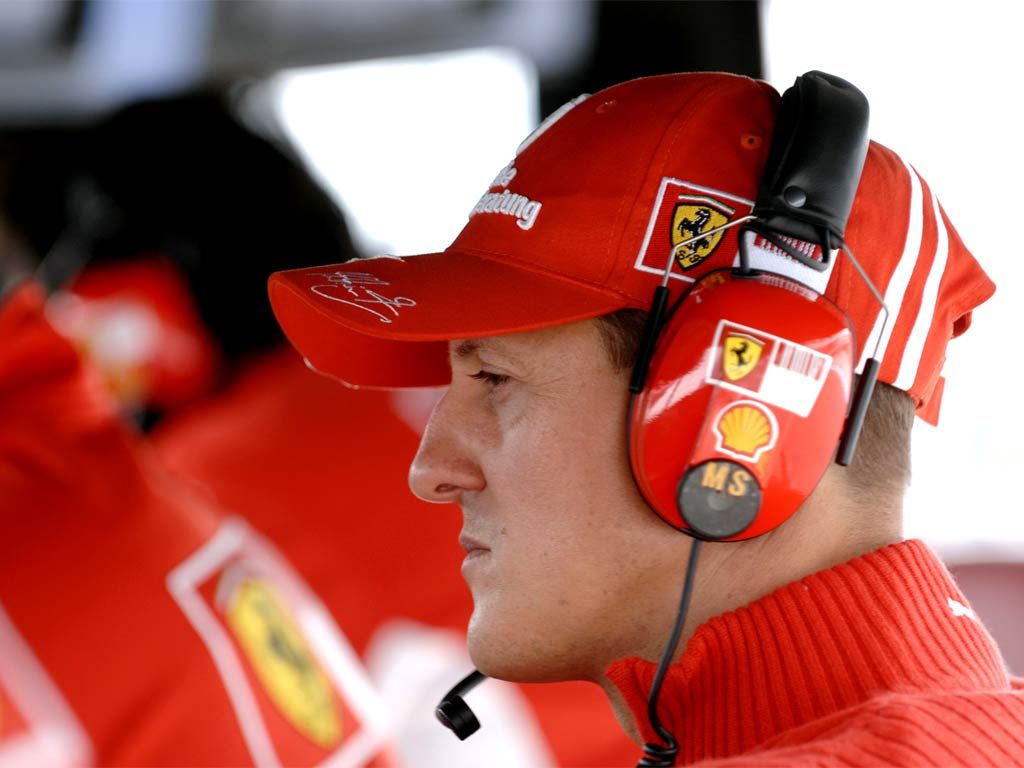The Pointless Comeback Of Michael Schumacher: A Hindsight Analysis.

Table of Contents
The Context of Schumacher's Comeback
The Allure of a Final Challenge
Michael Schumacher's legendary status as a seven-time world champion fueled an enduring competitive drive. His comeback wasn't just about racing; it was about proving himself against a new generation of drivers. The allure of one last challenge, a chance to add another chapter to his already illustrious career, was undeniably powerful.
- Unwavering Competitive Spirit: Schumacher's fierce competitiveness was legendary. He thrived on the challenge and sought to remain at the pinnacle of motorsport.
- A New Chapter: The opportunity to race for Mercedes, a team with significant potential, presented a fresh and exciting challenge.
- Extending the Legacy: A successful comeback could have solidified his place in history, perhaps even adding another world championship to his collection. He aimed to extend his already dominant legacy.
Mercedes' Strategic Goals
Mercedes' decision to sign Schumacher wasn't purely based on his racing prowess; it was a shrewd strategic move. Securing a driver of Schumacher's caliber brought unparalleled brand recognition and vast experience to the team.
- Boosting Team Performance: Mercedes hoped Schumacher's expertise could accelerate their development and help them compete with established top teams.
- Enhancing Brand Image: The association with Schumacher, a global icon, significantly elevated Mercedes' profile and marketing opportunities.
- Valuable Experience: Schumacher's extensive experience and knowledge of the sport were invaluable assets to a team striving to improve its performance. This was a significant factor in the decision-making process.
The Reality of the Comeback: Performance and Challenges
Underwhelming Performance
Despite the high hopes, Schumacher's comeback years were marked by underwhelming performance. He struggled to adapt to the changing dynamics of Formula 1, consistently falling short of expectations.
- Lack of Podium Finishes: His results paled in comparison to his previous dominance. He struggled to achieve consistent podium finishes and secure victories.
- Struggles Against Younger Drivers: He faced stiff competition from younger, faster drivers such as Lewis Hamilton and Fernando Alonso, highlighting the changing dynamics of the sport.
- Adapting to New Technology: The technological advancements in Formula 1 cars during his absence presented significant challenges for Schumacher.
The Physical and Mental Toll
Formula 1 racing demands immense physical and mental fortitude. Returning after a significant break amplified the already taxing demands on Schumacher's body and mind.
- Intense Physical Fitness: Maintaining the necessary level of physical fitness at his age presented a significant hurdle.
- Psychological Pressure: The pressure to perform at the highest level, coupled with the weight of expectation, undoubtedly took a toll on his mental state.
- Exacerbated Injuries: The rigorous demands of the sport potentially exacerbated any pre-existing injuries, impacting his performance and overall well-being.
The Skiing Accident and its Impact
The Unforeseen Tragedy
The devastating skiing accident in 2013 cast a long shadow over Schumacher's comeback narrative. The severity of his injuries and the long road to recovery shifted the focus from his racing performance to his health and well-being.
- Devastating Consequences: The accident resulted in severe and long-lasting injuries, highlighting the inherent risks in high-impact sports.
- Long-Term Health Impact: The accident's effects continue to impact Schumacher's life to this day, underscoring the potentially irreversible consequences of high-risk activities.
- Controversy and Speculation: The circumstances surrounding the accident and its long-term implications generated substantial debate and speculation.
A Tragic Counterpoint to the Comeback Narrative
The skiing accident fundamentally altered the perception of Schumacher's comeback. What once seemed like a bold attempt to reclaim his glory now serves as a poignant reminder of the inherent risks in professional motorsport.
- Risks of Professional Motorsports: The accident underscores the inherent dangers of high-speed racing and the potential for catastrophic injury.
- A Pointless Pursuit?: The tragedy casts a dark shadow over the entire comeback narrative, leading many to question whether the risks were truly worth the reward.
- Re-evaluation of Ambition: The accident prompts a broader reflection on the balance between ambition and the potential for devastating consequences.
Conclusion
In hindsight, Michael Schumacher's comeback, while understandable given his competitive spirit and the allure of a final challenge, proved to be a less-than-successful endeavor. His underwhelming performance and the tragic skiing accident raise serious questions about the ultimate cost of his ambition. The physical and mental toll, coupled with the unforeseen tragedy, ultimately overshadow the strategic goals of both the driver and the team. The risks significantly outweighed the potential rewards.
Takeaway: Michael Schumacher's return to Formula 1 serves as a cautionary tale, demonstrating the significant risks associated with high-level competition and the unpredictable nature of fate.
Call to Action: Do you agree that Michael Schumacher's comeback was pointless? Share your thoughts on this complex sporting story in the comments below. Let's discuss the legacy of Schumacher's comeback and analyze the ultimate cost of his ambition. Was the risk of a Formula 1 comeback ultimately worth it?

Featured Posts
-
 Conseil Municipal De Biarritz Debat Sur Le Budget Les Logements Saisonniers Et Sainte Eugenie
May 20, 2025
Conseil Municipal De Biarritz Debat Sur Le Budget Les Logements Saisonniers Et Sainte Eugenie
May 20, 2025 -
 Cote D Ivoire Comprendre Le Nouveau Systeme De Numerotation Des Batiments A Abidjan
May 20, 2025
Cote D Ivoire Comprendre Le Nouveau Systeme De Numerotation Des Batiments A Abidjan
May 20, 2025 -
 Jennifer Lawrence Rozhdenie Vtorogo Rebenka
May 20, 2025
Jennifer Lawrence Rozhdenie Vtorogo Rebenka
May 20, 2025 -
 Mick Schumacher La Crisis Sentimental Del Piloto Y Su Aparicion En App De Citas
May 20, 2025
Mick Schumacher La Crisis Sentimental Del Piloto Y Su Aparicion En App De Citas
May 20, 2025 -
 Drugo Dijete Jennifer Lawrence Sve Sto Znamo
May 20, 2025
Drugo Dijete Jennifer Lawrence Sve Sto Znamo
May 20, 2025
Latest Posts
-
 Iznenadenje Jennifer Lawrence Ponovno Mama
May 20, 2025
Iznenadenje Jennifer Lawrence Ponovno Mama
May 20, 2025 -
 Jennifer Lawrence Majcinstvo I Drugo Dijete
May 20, 2025
Jennifer Lawrence Majcinstvo I Drugo Dijete
May 20, 2025 -
 Novo Dijete Jennifer Lawrence Obiteljska Sreca
May 20, 2025
Novo Dijete Jennifer Lawrence Obiteljska Sreca
May 20, 2025 -
 Potvrda Jennifer Lawrence Dobila Drugo Dijete
May 20, 2025
Potvrda Jennifer Lawrence Dobila Drugo Dijete
May 20, 2025 -
 Jennifer Lawrence I Drugo Dijete Objava I Reakcije
May 20, 2025
Jennifer Lawrence I Drugo Dijete Objava I Reakcije
May 20, 2025
